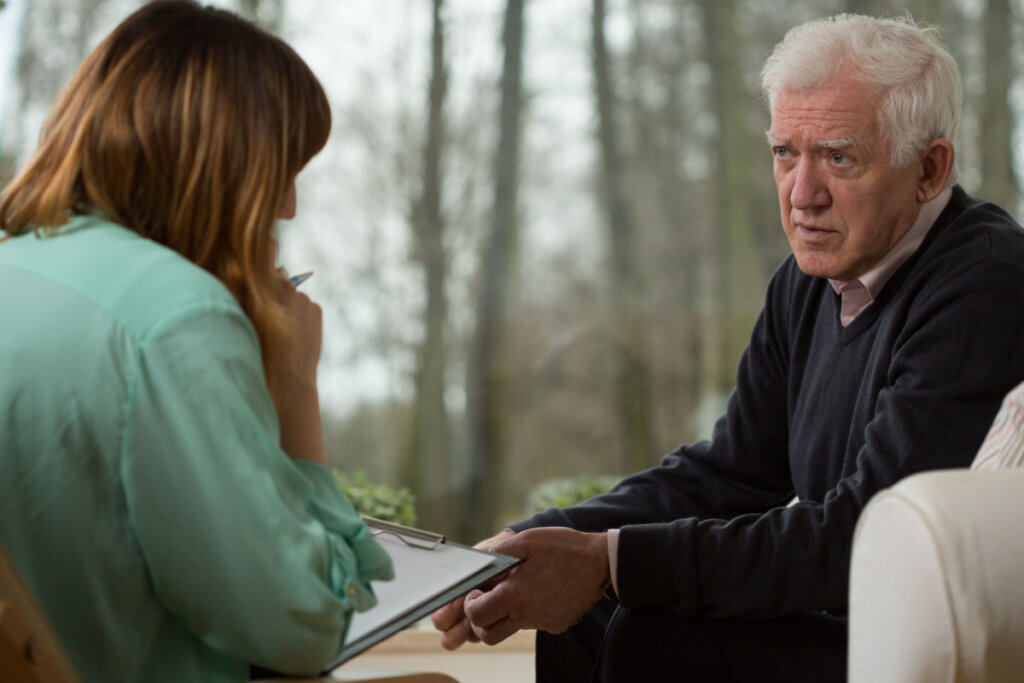Existential Therapy for Treating Depression


Written and verified by the psychologist Valeria Sabater
Søren Kierkegaard said that happiness is the greatest hiding place for despair. This is well-recognized by anyone dealing with a mood disorder, more especially depression. As a matter of fact, it isn’t easy to find well-being and fulfillment in a world that often seems chaotic and meaningless.
As humans, one of our most basic impulses is finding meaning in life. However, if your circumstances, contexts, and personal trajectory make it difficult for you to take that step, the kind of suffering and anguish that’s so often spoken of by philosophers will emerge. In effect, your mind will become desperate to find a meaning to what’s happening to you and a purpose for what’s surrounding you.
Indeed, it’s really difficult to move forward, relate, and be productive when, inside you, lie only gaps and unanswered questions. Moreover, these characteristics can sometimes lead to existential depression. This disorder was first described in the 1950s by the psychiatrist, Heinz Häfner.
Existential therapy oriented to the treatment of existential depression first emerged within the field of humanistic psychotherapy. It’s more of a philosophical than a clinical approach, but this doesn’t mean it’s any less interesting.
“The human being is a synthesis of the temporal and the eternal, of the finite and the infinite.”
-Søren Kierkegaard-

Goals of existential therapy for depression
One of the current exponents of existential therapy is the psychiatrist, Irvin Yalom. He’s given this resource a framework and a synthesis, as well as great significance. In his book, Existential Psychotherapy (1980), he defined this approach as a dynamic therapeutic framework that focuses on the problems that we experience when thinking about existence.
At some point, we all face certain eternal challenges. For instance, you might experience a lack of meaning in your life or try and understand why death occurs. Freedom or a lack of it, as well as feelings of emptiness or isolation, are also dimensions that can provoke anxiety. In fact, at times, you only have to suffer a betrayal or a breakup to feel that your life lacks meaning.
This explains the substratum of existential depression. It frequently emerges after certain traumatic events. Let’s see how this type of therapy can help us in these circumstances.
Existential therapy doesn’t have a structured or ‘one size fits all’ therapeutic strategy. The goal is to provide support to each individual. At the same time, they recognize their values and meanings and gradually start to make new decisions.
General goals
Existential therapy understands that the client’s psychological discomfort isn’t due to a single cause. It’s not just due to the loss of a family member. It’s not only triggered by a separation, the loss of a job, or not being able to establish lasting and happy relationships. We all deal with buried existential concerns that we must know how to identify and deal with.
The general goal of the therapist is to identify the existential anxieties of each client and the type of conflict they’re suffering in relation to themselves and the world. It should be remembered that an individual with depression feels that nothing makes sense and that they lack the resources to change their life. They feel alone, defenseless, and empty.
The general goal of the existential therapist is to facilitate their client’s reconnection with the world, find new vital meanings, and reconquer their feelings of autonomy and hope.
The four kingdoms and the specific objectives
This therapeutic approach has four specific objectives. It starts from the idea that the human being is integrated into four realms of experience and existence. These must be analyzed to better understand their suffering. They’re as follows:
- The physical realm. What needs does the client have? What do they desire? How’s their physical health in terms of sleep, diet, etc? Therapy aims to provide them with sufficient harmony.
- The personal realm. How’s their sense of self? Are they aware of their strengths and virtues? Defining them and achieving good self-knowledge is another aim of existential therapy.
- Social realm. What type of relationship do they have with their environment, family, society, and culture that surrounds them? How can they be helped/guided to feel more satisfied and happy in their social world?
- The making realm. Existential therapy helps the client achieve new vital meanings by updating their beliefs and trust in themselves and in the world.
Existential therapy understands that depression isn’t something an individual has, it’s the way they feel about existing in an often complex and meaningless world.

Techniques and strategies
Existential therapy has been practiced for decades. Figures like Irvin Yalom endorse its effectiveness. However, a study conducted by the University of Colorado Springs (USA) claims that, although this therapy is evidence-based, more research is required to fully understand its benefits.
That said, existential therapy is used with good results in depression, post-traumatic stress disorders, grief, and for patients in palliative care. It’s used in those vital moments when individuals are trapped by restlessness, fear, and uncertainty, and need to find meaning in life.
Next, we’ll explain the techniques used by existential therapy for treating depression.
It provides a safe and empathetic space in which to reflect
Existential therapists build a safe environment that helps the client feel secure, understood, and free to express their thoughts and emotions. It’s a warm and nourishing setting where they can talk about their feelings, doubts, and sensations of emptiness.
The client is offered a framework to reflect and ask themselves questions. This helps them acquire new perspectives.
It focuses on the here and now
For existential therapy, the past of the person isn’t particularly important. It’s the present that matters. In fact, the client learns that they’re not defined by their past, nor are they destined for a specific purpose. They’re taught that life doesn’t always have meaning. They learn that the most important thing is that they feel free to act according to their own values, aspirations, and present needs.
It alleviates anguish
Existential therapy doesn’t judge. Nor does it offer the client a road map to achieve well-being and heal their depression. Its goal is to alleviate their anguish. In addition, it helps them outline an existence with greater meaning, with new transcendences and renewed hopes.
Clients learn the fundamental principles of existence
Susan Iacovou and Karen Weixel-Dixon, Ph.D. are the authors of Existential Therapy: 100 Key Points and Techniques. In this work, they suggest that existential therapy works on a series of fundamental principles. By delving into them, clients find many of the answers they seek:
- They understand that we’re all mortal beings and that most things are ephemeral.
- They recognize that they only have one chance to live their lives. Therefore, it should be done it in the best possible way, focusing on the here and now.
- They learn to accept the challenge of choosing how they want to live. Defining what they want, who they want in their lives, and what they want to achieve is useful in this respect.
- They learn to manage existential anxiety. To do this, they must find the courage to live with everyday uncertainty.
Existential therapy for depression offers the client encouragement, new perspectives, and answers to many of their deepest questions. After all, in a world that seems meaningless at times, we often need to search within ourselves for the meanings we need. Achieving a full and meaningful life requires constant self-exploration work. It’s well worth a try.
All cited sources were thoroughly reviewed by our team to ensure their quality, reliability, currency, and validity. The bibliography of this article was considered reliable and of academic or scientific accuracy.
- Feizi M, Kamali Z, Gholami M, Abadi BAGH, Moeini S. The effectiveness of existential psychotherapy on attitude to life and self-flourishing of educated women homemakers. J Educ Health Promot. 2019 Nov 29;8:237. doi: 10.4103/jehp.jehp_473_18. PMID: 31867401; PMCID: PMC6905282.
- Vos J, Craig M, Cooper M. Existential therapies: a meta-analysis of their effects on psychological outcomes. J Consult Clin Psychol. 2015 Feb;83(1):115-28. doi: 10.1037/a0037167. Epub 2014 Jul 21. PMID: 25045907.
This text is provided for informational purposes only and does not replace consultation with a professional. If in doubt, consult your specialist.








